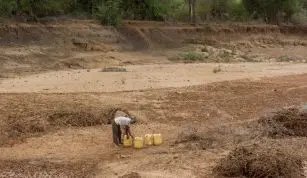People in Kenya’s arid and semi-arid lands (ASAL) are facing a dire situation and immediate action is needed to respond to the severe drought, said UN resident coordinator for Kenya Stephen Jackson, as he launched the Flash Appeal for the Kenya Drought response
Two-and-a-half million people are already experiencing deep food insecurity after two back-to-back rainy seasons failed. By November, it will have nearly tripled since the same time last year, the UN Coordination of Humanitarian Affairs (OCHA) warned.
The Kenya Drought Flash Appeal calls for nearly US$139.5mn to deliver relief to 1.3 million people whose lives have been hardest hit by the crisis. An estimated US$28.5mn has already been received from donors, including US$5mn from the United Nations Central Emergency Response Fund.
The appeal brings together 45 humanitarian partners, including UN agencies, international non-governmental organisations (NGOs), national NGOs and the Kenya Red Cross Society, to complement the government’s response to the drought crisis in the ASAL region.
Speaking from Nairobi, Jackson said people in Wajir, Northern Kenya, have not seen rain for over a year. Acute malnutrition rates are rising rapidly, posing an imminent risk to children and pregnant and lactating women.
He described how a mother at the El-Nur Clinic supported by the World Food Programme (WFP) and the UN Children’s Fund (UNICEF) “told me she could not feed her children that morning, and does not know if she would be able to put food on the table that evening. Many of her livestock have already died because of the drought. And all of this comes on top of the 2017 drought, COVID and the recent locust infestations”, he added.
Kenya urgently needs approximately US$60mn for food and job security, US$40mn for nutrition, US$20mn for Water, Sanitation and Hygiene (WASH), some US$10mn for health investments, and US$7mn for education and other related sectors. "We aim to deliver a full package of support in counties that will face the deepest and most severe needs in the months to come," the UN resident coordinator for Kenya said.




